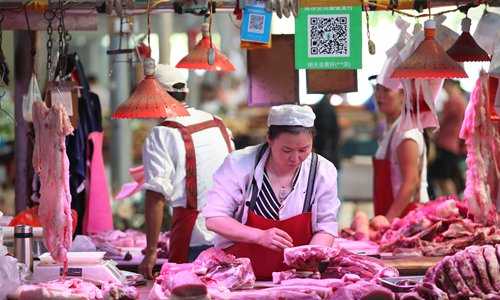African swine fever has caused loss of 1 trillion yuan in China

Chinese vendors sell pork in a market in Kunming, capital of Southwest China's Yunnan Province in June. Photo: IC
African swine fever (ASF) has caused a direct loss of 1 trillion yuan ($141 billion) in China, an expert said on Tuesday at a pig industry forum.
"The upstream and downstream of the industrial chain are not even included in the calculation of loss," said Li Defa, an academician at the Chinese Academy of Engineering, President of the College of Animal Science and Technology at the China Agricultural University and Vice President of the World Association for Animal Production, at a pig industry forum on Tuesday, Caixin reported.
At present, AI pig breeding is regarded as a major technological advance to solve the transmission of ASF, which is prone to cross-infection in pig farms. The fever spreads through contaminated facilities, syringes, clothing, workers' boots and other equipment. If cleaning and disinfection is not carried out, there will be cross-transmission.
Li commented that modern and intelligent farming has not yet formed a scale and industry chain. "AI pig breeding still needs time to be cultivated," said Li.
China's pork production has been expanding to a large scale of 50 million tons since 2010, statistics showed. Annual output was 54.51 million tons in 2017, when the pork imports were at 1.21 million tons and exports were at 51,300 tons. Half of the world's total output of pork was produced in China.
"Pork production was self-sufficient in China. ASF has shown that epidemic prevention is necessary and indispensable to animal husbandry. Otherwise, the industry will pay a big price," said Li.
According to data released by the National Bureau of Statistics (NBS), the price of live pigs had soared to 29.4 yuan per kilogram by the middle of September. The price had doubled when ASF broke out in August 2018.
"Due to various factors, the prices of products in the livestock industry are at their highest levels in history," Li added.
Li also pointed out that, according to Chinese people's eating habits, pork accounts for 60 percent of meat demand. Since Chinese people are highly dependent on pork, its price increase has had an impact on the consumer price index (CPI) and people's living standards.
The surge of pork prices has contributed significantly to CPI growth. According to NBS data, China's core CPI, excluding food, grew 1.7 percent from January to August, while the total CPI increased by 2.4 percent.
"China's estimated population of 1.4 billion is expected to consume 55 million tons of pork in 2020. If China loses more than half of its domestic pork production, it will not be easy to meet the demand gap by relying on foreign supplies," said Li.
The Chinese government has released 10,000 tons of frozen pork from its reserves into the market to reduce the fluctuations in prices and to increase supply, the Ministry of Commerce (MOFCOM) said on Friday.